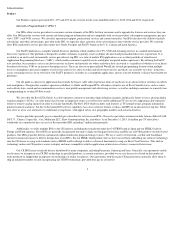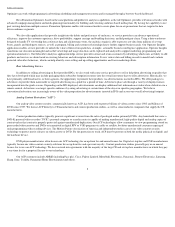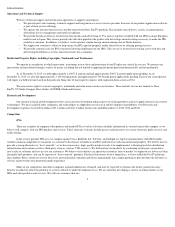TiVo 2015 Annual Report Download - page 16
Download and view the complete annual report
Please find page 16 of the 2015 TiVo annual report below. You can navigate through the pages in the report by either clicking on the pages listed below, or by using the keyword search tool below to find specific information within the annual report.
Table of Contents
The markets for the consumer hardware and software products sold by our customers are competitive and price sensitive. Licensing fees for our
technologies, products and services, particularly in the physical media, CE and personal computer areas, may decline due to competitive pricing pressures
and changing consumer demands. In addition, we may experience pricing pressures in other parts of our business. These trends could make it more difficult
for us to increase or maintain our revenue and could adversely affect our operating results. To increase per unit royalties, we must continue to introduce
new, highly functional versions of our technologies, products and services for which we can charge higher amounts. Any inability to introduce such
technologies, products and services in the future or other declines in the amounts we can charge would also adversely affect our revenues.
Some of our current or future competitors may have significantly greater financial, technical, marketing and other resources than we do, may enjoy
greater brand recognition than we do, or may have more experience or advantages than we have in the markets in which they compete. Further, many of the
consumer hardware and software products that include our technologies also include technologies developed by our competitors. As a result, we must
continue to invest significant resources in product development in order to enhance our technologies and our existing products and services and introduce
new high
-
quality technologies, products and services to meet the wide variety of such competitive pressures. Our ability to generate revenues from our
business will suffer if we fail to do so successfully.
We generate a significant portion of our revenue from patent license agreements with a small number of major pay TV operators which would lead to
substantial revenue loss and possible litigation if not renewed.
For the year ended
December 31, 2015
,
27%
of revenue was from our contracts with AT&T Inc. (including DIRECTV), Comcast and Time Warner
Cable. In September 2015, our contract with Time Warner Cable was extended to March 2016 and in December 2015, our contract with AT&T (including
DIRECTV) was extended to December 2022. Our contract with Comcast expires in March 2016. We cannot assure you that these license agreements will be
renewed on terms acceptable to us or at all. If we are unable to replace the revenue associated with these agreements through similar or other business
arrangements, our revenues and profit margins would decline and our business would be harmed as a result. In 2015, Time Warner Cable signed an
agreement to be acquired by Charter Communications. While it is our intent that if the acquisition is completed our license agreement with Charter
Communications will govern Time Warner Cable, the timing and structure of the pending acquisition could have a negative impact on licensing discussions
and/or revenue. We also cannot assure you that these license agreements will not be terminated under certain circumstances. Additionally, we may become
involved in litigation with these licensees in connection with attempting to negotiate new agreements. The existence and/or outcome of such litigation
could harm our business.
Our business may be adversely affected by fluctuations in the number of cable television, telecommunications television, and digital broadcast satellite
subscribers if the availability of OTT content services causes consumers to cancel their pay TV subscriptions.
For some of our technologies, we are paid a royalty based on the number of subscribers or set top
-
boxes our pay TV customers have. The ability
to enjoy digital entertainment content downloaded or streamed over the internet has enabled some consumers to cancel their pay TV subscriptions. If our
pay TV customers are unable to maintain their subscriber base, the royalties they owe us may decline.
Dependence on the cooperation of pay TV operators, television broadcasters, hardware manufacturers, data providers and delivery mechanisms could
adversely affect our revenues.
We rely on third party providers to deliver our IPG data to some of the CE devices that include our IPG. Further, our national data network provides
customized and localized listings to our IPG service for pay TV and licensees of our data used in third party IPGs for pay TV. In addition, we purchase
certain Metadata from commercial vendors that we redistribute. The quality, accuracy and timeliness of that Metadata may not continue to meet our
standards or be acceptable to consumers. There can be no assurance that commercial vendors will distribute data to us without error or that the agreements
that govern some of these relationships can be maintained on favorable economic terms. Technological changes may also impede the ability to distribute
Metadata. Our inability to renew these existing arrangements on terms that are favorable to us, or enter into alternative arrangements that allow us to
effectively transmit our Metadata to CE devices could have a material adverse effect on our CE IPG and IPG data business.
Our business may be adversely affected by fluctuations in demand for CE devices incorporating our technologies.
14
























